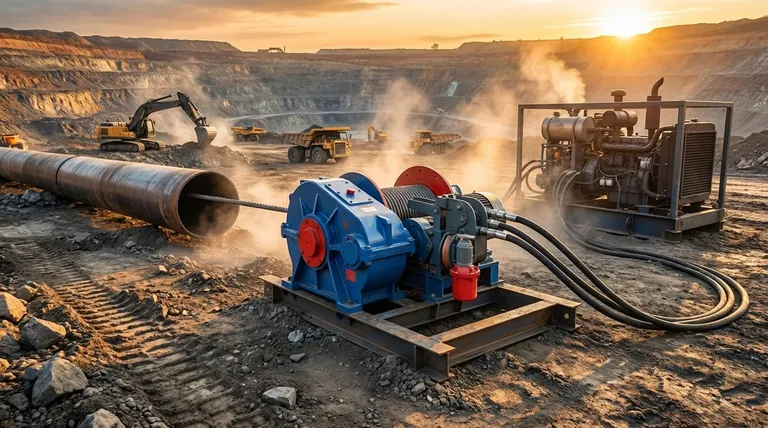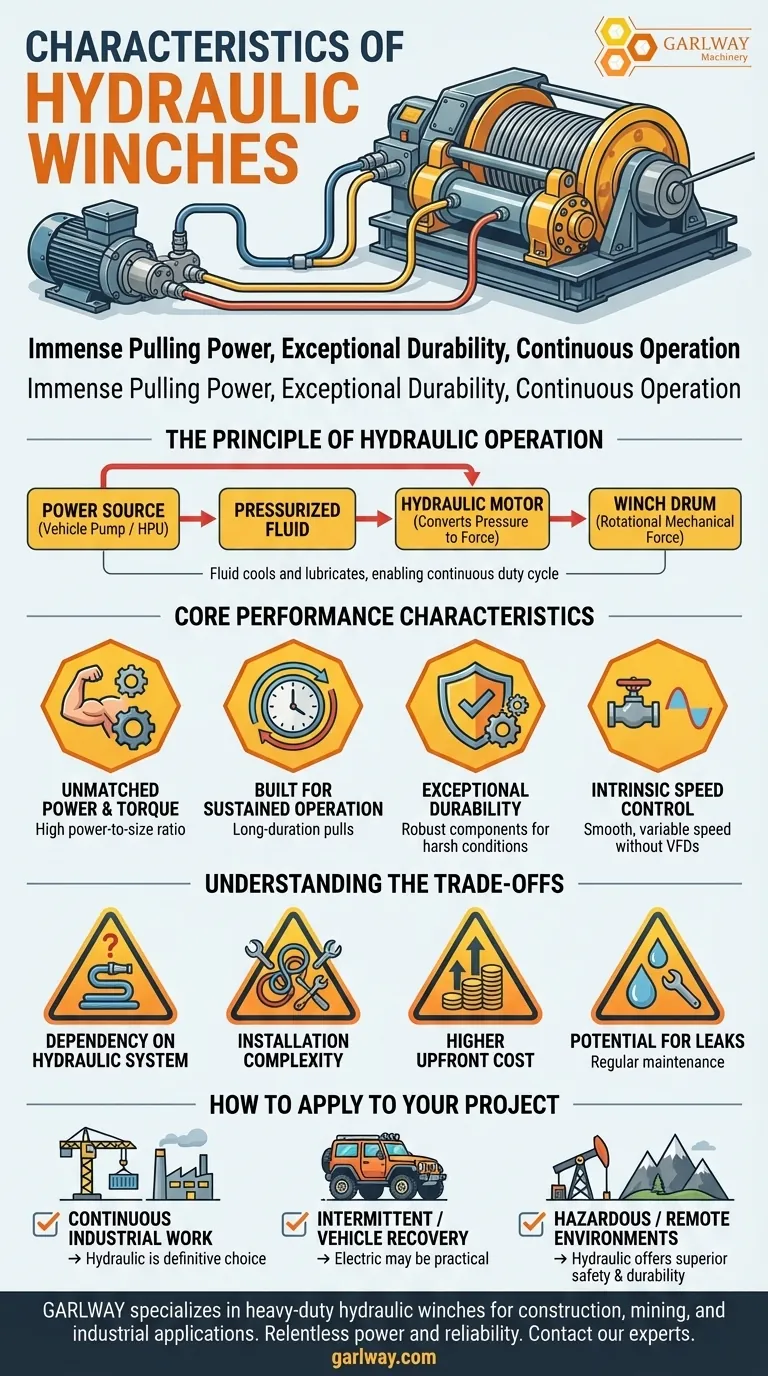At their core, hydraulic winches are characterized by immense pulling power, exceptional durability, and the ability to operate continuously without overheating. They function by using pressurized hydraulic fluid, typically supplied by a vehicle's power steering pump or a dedicated hydraulic power unit, to drive a motor that turns the winch drum.
The defining characteristic of a hydraulic winch is its capacity for sustained, heavy-duty work. Unlike electric counterparts that can overheat, a hydraulic system can run as long as its power source is active, making it the superior choice for industrial applications where reliability is non-negotiable.

The Principle of Hydraulic Operation
A hydraulic winch is a component of a larger hydraulic system. Understanding this relationship is key to understanding its characteristics.
The Power Source is Key
A hydraulic winch does not create its own power. It relies on an external pump to pressurize hydraulic fluid. This is most often the power steering pump on a truck or a dedicated Hydraulic Power Unit (HPU) on industrial equipment.
Translating Fluid to Force
The pressurized fluid is sent through reinforced hoses to the winch's hydraulic motor. This motor converts the pressure and flow of the fluid into rotational mechanical force, which provides the high torque needed to turn the winch drum and pull heavy loads.
A Continuous Duty Cycle
Because the hydraulic fluid also serves to cool and lubricate the system components, the winch can operate continuously for long periods. The only limitation is the runtime of the engine or motor powering the hydraulic pump.
Core Performance Characteristics
The hydraulic design directly results in several distinct performance advantages, especially when compared to electric winches.
Unmatched Power and Torque
Hydraulic winches deliver a very high power-to-size ratio. They are engineered to handle extremely heavy loads, often far exceeding the capacity of similarly sized electric winches.
Built for Sustained Operation
The ability to perform long-duration, heavy pulls without overheating or failing is their most significant advantage. This makes them ideal for tasks that require constant tension or extended recovery operations.
Exceptional Durability
These winches are built with robust components designed to withstand the high pressures of a hydraulic system. This inherent strength makes them highly reliable and durable, even in harsh environmental conditions.
Intrinsic Speed Control
The speed of a hydraulic winch can be varied simply by controlling the flow of the hydraulic fluid. This allows for smooth, variable speed control without the need for the expensive and complex variable frequency drives (VFDs) required for electric motors.
Understanding the Trade-offs
While powerful, hydraulic winches are not the universal solution. Their unique requirements present clear trade-offs.
Dependency on a Hydraulic System
The most significant limitation is the absolute requirement for a hydraulic power source. If your vehicle or equipment does not have one, you must install a separate power unit, adding cost and complexity.
Installation Complexity
Installing a hydraulic winch involves tapping into an existing hydraulic system or installing a new one. This requires routing high-pressure hoses and ensuring proper connections, which is typically more involved than wiring an electric winch.
Higher Upfront Cost
The robust construction and precision components mean that hydraulic winches generally have a higher initial purchase price than electric models.
Potential for Leaks
As with any hydraulic system, there is a risk of fluid leaks from hoses or fittings. A leak can disable the winch and create an environmental mess, requiring diligent maintenance and inspection.
How to Apply This to Your Project
Your choice depends entirely on the demands of the task at hand.
- If your primary focus is continuous, heavy-duty industrial work: A hydraulic winch is the definitive choice for its non-stop performance, immense power, and reliability.
- If your primary focus is intermittent use or vehicle self-recovery: An electric winch is often more practical due to its simpler installation and lower dependency on the vehicle's systems.
- If your primary focus is operating in hazardous or remote environments: A hydraulic winch offers superior durability and a safer operational profile, making it a trusted tool for industries like mining, logging, and oil and gas.
Ultimately, a hydraulic winch is an investment in relentless power and unwavering reliability for the most demanding tasks.
Summary Table:
| Characteristic | Advantage | Consideration |
|---|---|---|
| Power Source | Driven by hydraulic system (e.g., vehicle pump or HPU) | Requires existing hydraulic system or dedicated power unit |
| Duty Cycle | Can operate continuously without overheating | Ideal for long-duration, heavy pulls |
| Durability | Robust components withstand harsh conditions | Higher upfront cost compared to electric models |
| Speed Control | Smooth, variable control via hydraulic fluid flow | Installation is more complex than electric winches |
| Reliability | Non-stop performance for industrial tasks | Risk of fluid leaks requires regular maintenance |
Need a winch that won't quit under pressure? GARLWAY specializes in heavy-duty hydraulic winches for construction, mining, and industrial applications. Our winches deliver the relentless power and reliability your projects demand. Contact our experts today to find the perfect hydraulic solution for your needs!
Visual Guide

Related Products
- Electric and Hydraulic Winch for Heavy Duty Applications
- Hydraulic Concrete Mixer Machine Cement Mixing Equipment for Mixture Concrete
- JDY350 Electric Hydraulic Mortar Mud Concrete Mixer
- Small Electric Winch 120V and 240V for Compact Applications
- Electric 120V Boat Winch by Badlands
People Also Ask
- What are the components of an electric winch? A Guide to Its Core Systems & Power
- What is the power source of the JK quick winch? Reliable 3-Phase Motor for Heavy Lifting
- What is the use of anchor winch? Essential Power for Marine & Industrial Lifting
- What is the primary role of industrial winches? The Core of Heavy-Duty Lifting and Pulling
- How is the quick winch typically configured in construction applications? Essential Setup for Safe & Efficient Lifting
- How to use a winch to recover another vehicle? A Step-by-Step Guide to Safe & Effective Recovery
- Is investing in a winch for a trailer worthwhile? Boost Safety & Efficiency for Heavy Loads
- What are the advantages and disadvantages of wire rope electric hoists with the motor outside the drum?



















